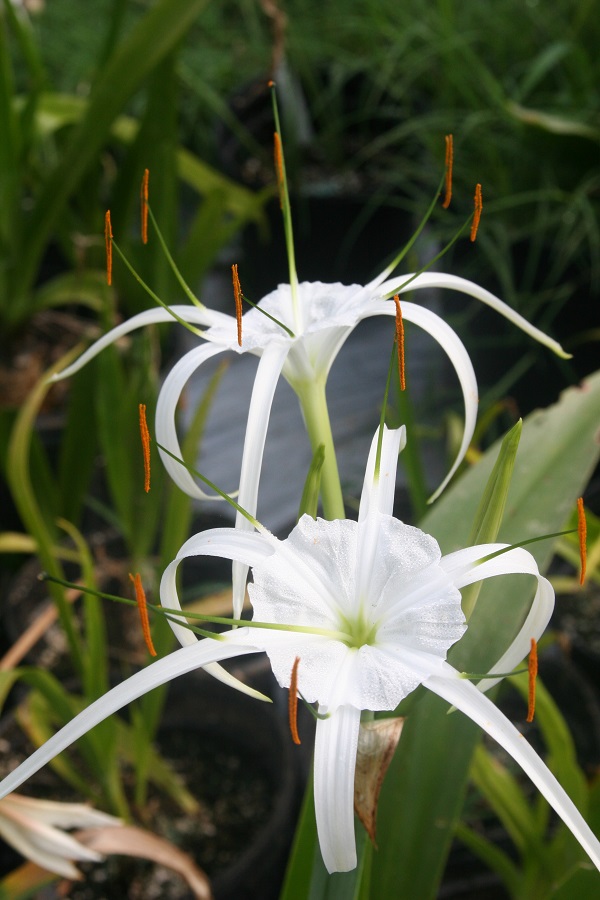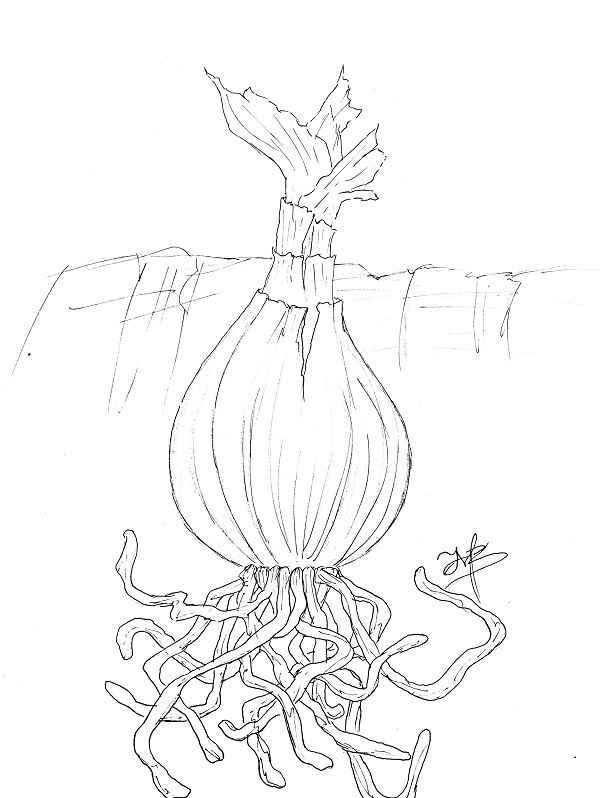

Hymenocallis 'Tropical Giant'

Around our company, we often just call this bulb, the "Tropical Giant." It is often called a "white spider lily" because of the white spidery blooms that it produces; however, this is not related to the red spider lily at all. This bulb is in the Hymenocallis family and is a summer-producing bulb. The foliage looks nice throughout the summer, making it a favorite accent plant used by landscapers in public gardens (i.e. take a walk along the River Walk in San Antonio and you'll see plenty of them a short distance from the Alamo).

Texture is such an important part of your garden. We love color in our gardens, and that is what seems to draw our attention first, but it is the texture in the garden that provides the canvas and form for your garden. The "Topical Giant' is one of our favorites for providing texture to your garden, especially in the 100+ degree temperatures of late summer.

Foliage: The foliage of the "Topical Giant" is amazing! The dark green foliage reaches up to 3-4 feet tall and is long and strong which continues to stand up in the summer heat. The foliage doesn't wilt during the hot summer months in 100+ degree temperatures with the full sun beating down on it.

Blooms: The "Tropical Giant" looks like a great plant and then suddenly in mid-July little puffs of white burst forth all over the plant. The white spidery blooms seem to sit on top of the foliage as if waiting for a strong wind to blow them off.
Dependable: "Tropical Giants" thrive in zones 8-10. As one of the most cold hardy varieties for this semi-tropical plant, they are known for multiplying quickly and surviving freezing temperatures. On the other hand, I've seen them on the Yucatan Peninsula and across Belize where they grow with reckless abandon and never go dormant. In our Zone 8, where we recently reached 3 degrees F., a little mulch is always a good idea. The foliage will die back with the first frost, but the bulbs are fine. This is a great opportunity to clean around the beds, cut back your other perennials, and plant plenty of daffodils, snowflakes, and other spring blooming bulbs that will carry your garden through the winter months.

Plant: Allow the very tip of the bulb to be visible above the dirt. Plant in well-drained soil where the bulb will receive 8+ hours of sun a day. It can absolutely be planted where it will receive full sun!
The lush foliage in the summer time is a great home for anoles, some of our favorite lizard friends.
Hymenocallis 'Tropical Giant'

Around our company, we often just call this bulb, the "Tropical Giant." It is often called a "white spider lily" because of the white spidery blooms that it produces; however, this is not related to the red spider lily at all. This bulb is in the Hymenocallis family and is a summer-producing bulb. The foliage looks nice throughout the summer, making it a favorite accent plant used by landscapers in public gardens (i.e. take a walk along the River Walk in San Antonio and you'll see plenty of them a short distance from the Alamo).

Texture is such an important part of your garden. We love color in our gardens, and that is what seems to draw our attention first, but it is the texture in the garden that provides the canvas and form for your garden. The "Topical Giant' is one of our favorites for providing texture to your garden, especially in the 100+ degree temperatures of late summer.

Foliage: The foliage of the "Topical Giant" is amazing! The dark green foliage reaches up to 3-4 feet tall and is long and strong which continues to stand up in the summer heat. The foliage doesn't wilt during the hot summer months in 100+ degree temperatures with the full sun beating down on it.

Blooms: The "Tropical Giant" looks like a great plant and then suddenly in mid-July little puffs of white burst forth all over the plant. The white spidery blooms seem to sit on top of the foliage as if waiting for a strong wind to blow them off.
Dependable: "Tropical Giants" thrive in zones 8-10. As one of the most cold hardy varieties for this semi-tropical plant, they are known for multiplying quickly and surviving freezing temperatures. On the other hand, I've seen them on the Yucatan Peninsula and across Belize where they grow with reckless abandon and never go dormant. In our Zone 8, where we recently reached 3 degrees F., a little mulch is always a good idea. The foliage will die back with the first frost, but the bulbs are fine. This is a great opportunity to clean around the beds, cut back your other perennials, and plant plenty of daffodils, snowflakes, and other spring blooming bulbs that will carry your garden through the winter months.

Plant: Allow the very tip of the bulb to be visible above the dirt. Plant in well-drained soil where the bulb will receive 8+ hours of sun a day. It can absolutely be planted where it will receive full sun!
The lush foliage in the summer time is a great home for anoles, some of our favorite lizard friends.